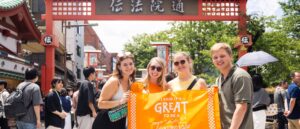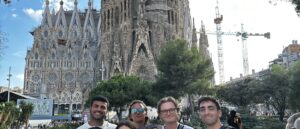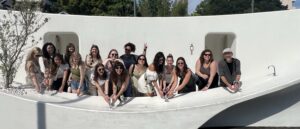
Study Abroad
Our abroad and off-campus programs offer students the unique opportunity to engage with diverse cultures, fostering growth and understanding through immersive travel experiences.

By exploring architectural traditions and design innovations across the globe, students develop a deeper appreciation for the cultural forces shaping the built environment.
The Bachelor of Architecture Program requires students to participate in a full-semester off-campus experience that includes a studio and electives. The Bachelor of Science in Interior Architecture encourages students to pursue international engagement, including their summer full-semester program or through study abroad mini-terms, on-campus studios with international field trip components, and on-campus studios that are partnered with international partners and universities. Students pursuing a Bachelor of Fine Arts in Graphic Design have opportunities to study abroad in various school- and college-sponsored mini-term courses.
Full-Semester Programs
Students can participate in abroad or off-campus programs throughout the calendar year. Take a look at the reoccurring programs offered by our college:
Spring
Italy
The Rome Alliance program, in collaboration with the University of Arkansas, offers architecture students a unique opportunity to study in Rome, blending design with cultural and historical insights.
Summer
Finland
The Finland Summer Architecture Institute at Aalto University offers architecture students the chance to explore the role of architecture in shaping national cultural identity.
Interior Architecture in Japan
The Japan study abroad program immerses students in the rich history and contemporary design practices of Japan, with a focus on architectural and cultural landmarks in Kyoto, Tokyo, Osaka, and beyond.
Poland
Established in 1992, this is the longest-running program offered by the college, located at Cracow University of Technology. The program has helped in the “rediscovery” of the architectural treasures that were previously not very accessible to the West, while providing student their own design studio near Krakow’s historic center.
Fall
Architecture in Japan
The Tokyo study abroad program immerses students in the dynamic blend of traditional and modern Japanese culture, from ancient temples to cutting-edge architecture.
Mini-Term Opportunities
Mini-term experiences provide opportunities for short-term culturally immersive study. They explore a range of travel locations across various continents and are led by a faculty with diverse approaches and interests associated with international and domestic travel and research. Courses may be one-time offerings, though several are recurrent, either sequentially or alternating years.
Summer
Finland
The Helsinki summer program offers a deep dive into Finnish culture and design through organized walking tours, hands-on studio work, and visits to renowned art and architecture museums. Students will explore the city’s rich history and contemporary design while working at Metropolia University, culminating in a final presentation of their design work.
Winter
Vietnam and Thailand
The Southeast Asia winter program immerses students in the vibrant intersection of tradition and modernity across Thailand and Vietnam. Students will explore the rich cultural landscapes, comparing traditional craftsmanship with contemporary manufacturing techniques while reflecting on how these regions can preserve their heritage while engaging with global markets.
Explore Other Programs
In addition to the programs offered by our college, the university’s Programs Abroad office provides options for overseas study, research, intern and service-learning programs. Get started by visiting the Programs Abroad Office for more information.